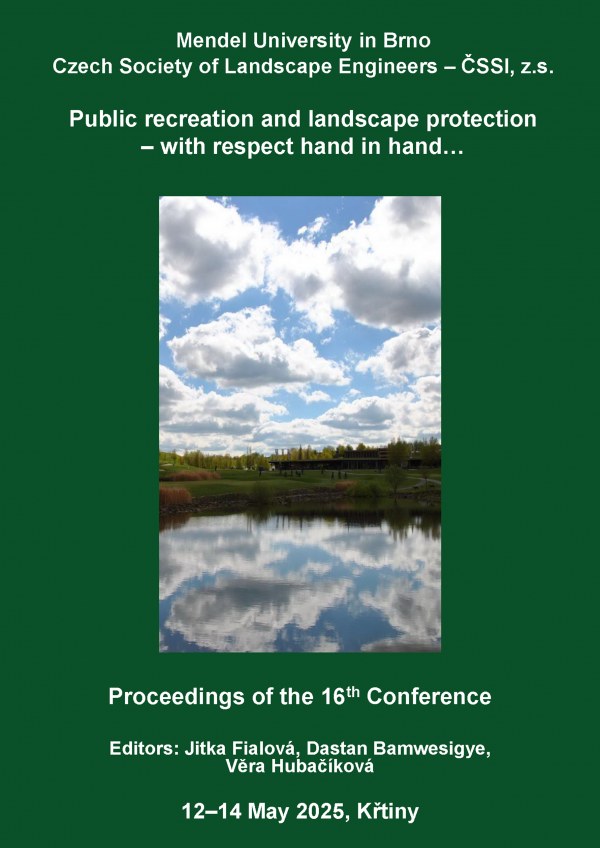
DOI: 10.11118/978-80-7701-025-2-0113
FUNDING CITY GREEN SPACES: WILLINGNESS TO PAY FOR URBAN FORESTRY INITIATIVES, GREENERY AND PARK RECREATION SERVICES
- Dastan Bamwesigye1,2, Jitka Fialova1
- 1 Department of Landscape Management, Faculty of forestry and Wood Technology, Mendel University in Brno, Zemėdėlská 3, 613 00 Brno, Czechia
- 2 Department of Forest and Wood Products Economics and Policy, Faculty of Forestry and Wood Technology, Mendel University in Brno, Czechia
While urban forests and green parks play a vital role in the livelihood of urban dwellers and the climate in general, few exist in many parts of the world, including Uganda. This research aimed to explore community perceptions and willingness to pay (invest) in the development of urban parks, green spaces, and forestry within four districts of Uganda, namely Kampala, Mbarara, Fort Portal, and Gulu. Using a quantitative research approach, the study employed online questionnaires to collect data from 501 respondents, and the Contingent Valuation Method and Double-Bound Discrete Choice were used to determine the willingness to pay (WTP) for improvement in urban greenery. The results show that about 66% of the respondents are content with the current parks, and 27% of them are not contented, showing a deficiency in urban greenery. Almost all the respondents, about 99%, agreed to more funding for green spaces for youth, and 90% were willing to pay for urban greenery and forests. The most WTP amount (62%) annually was between 10,000 to 50,000 UGX (approximately $2.5 and $3.5 United States Dollars). The respondents’ preferences were recommendations for more public parks (77%), an increase in the funding of tree projects (67%), and the promotion of community gardening (49%) as necessary to improve urban greenery. The study showed a high level of support for the urban forestry initiatives and the need for integration in the planning process. The study recommends that policymakers increase the funding to improve urban greenery.
Keywords: urban green spaces, community engagement, willingness to pay, urban forestry, environmental sustainability, mental and pysical health, public park services
pages: 113-118, Published: 2025, online: 2025
References
- Bamwesigye, D., Hlavackova, P., Sujova, A., Fialova, J., & Kupec, P. (2020). Willingness to Pay for Forest Existence Value and Sustainability. Sustainability, 12(3), 891.
 Go to original source...
Go to original source... - Bamwesigye, D. (2023). Willingness to Pay for Alternative Energies in Uganda: Energy Needs and Policy Instruments towards Zero Deforestation 2030 and Climate Change. Energies, 16(2), 980.
 Go to original source...
Go to original source... - Binyanya, M. R., Mugwima, N. B., Karanja, D., & Mbiti, S. (2022). Sustainable Urban Forest Conservation: Assessing Public Attitudes towards Urban Forests in Nairobi City. Current Urban Studies, 10(4), 655-672.
 Go to original source...
Go to original source... - Chisika, S. N., & Yeom, C. (2023). Smart Urban Forest Management in East Africa: The Case of Nairobi and Kampala Cities. Sage Open, 13(3), 21582440231194137.
 Go to original source...
Go to original source... - Cilliers, S., Cilliers, J., Lubbe, R., & Siebert, S. (2013). Ecosystem Services of Urban Green Spaces in African Countries-Perspectives and Challenges. Urban Ecosystems, 16, 681-702.
 Go to original source...
Go to original source... - Cheng, Y., Ding, J., & Liu, H. (2022). Analysis and Assessment of Urban Green Space Coverage Using Remote Sensing Spatial Imagery. Academic Journal of Environment & Earth Science, 4(4). https://doi.org/10.25236/ajee.2022.040406
 Go to original source...
Go to original source... - Dai, D. (2011). Racial/Ethnic and Socioeconomic Disparities in Urban Green Space Accessibility: Where to Intervene? Landscape and Urban Planning, 102(4), 234-244. https://doi.org/10.1016/j.landurbplan.2011.05.002
 Go to original source...
Go to original source... - Gizachew, B., Solberg, S., & Puliti, S. (2018). Forest Carbon Gain and Loss in Protected Areas of Uganda: Implications to Carbon Benefits of Conservation. Land, 7(4), 138. https://doi.org/10.3390/land7040138
 Go to original source...
Go to original source... - Lee, J. (2017). Experimental Study on the Health Benefits of Garden Landscape. International Journal of Environmental Research and Public Health, 14(7), 829. https://doi.org/10.3390/ijerph14070829
 Go to original source...
Go to original source... - Lwasa, S., Mugagga, F., Wahab, B., Simon, D., Connors, J., & Griffith, C. (2014). Urban and Peri-Urban Agriculture and Forestry: Transcending Poverty Alleviation to Climate Change Mitigation and Adaptation. Urban climate, 7, 92-106.
 Go to original source...
Go to original source...


